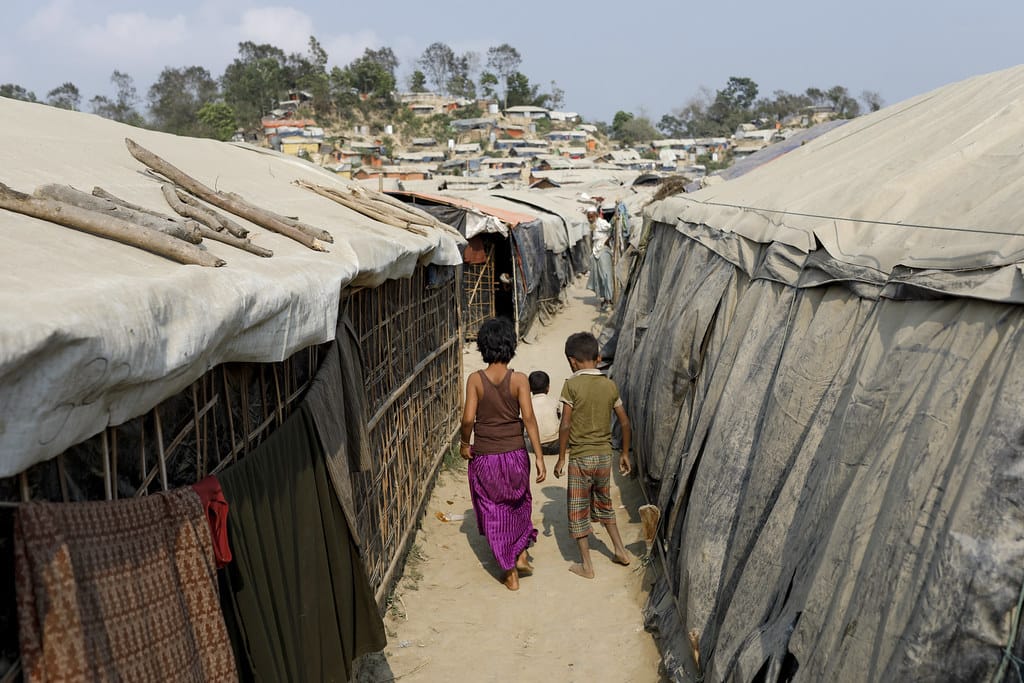Rohingya: stateless and now homeless

By Adhya Moona, MA Global Media and Communications
Trigger warning: mentions of sexual violence and death
A fire swept through Rohingya refugee camps in southern Bangladesh on 14 January, destroying the homes of thousands of people. The UN Refugee Agency (UNHCR) said that more than 550 shelters accommodating about 3,500 people, 150 shops, and a community centre were completely destroyed in the blaze. The UN reported that there were no casualties, and the fire was brought under control in a few hours by firefighters, volunteers, and refugees.
The UNHCR said ‘security experts are liaising with the authorities to investigate the cause of fire.’ Marin Din Kajdomcaj, an official with the UNHCR in Cox’s Bazar said, ‘We are working with our Government and NGO partners, other UN agencies, and Rohingya refugees to help people who have lost their homes and possessions during last night’s terrible fire in the refugee camp at Nayapara.’ The UN World Food Programme (WFP) is providing emergency food assistance, including hot meals, to families affected by the fire.
The fire added to the ongoing ordeals of Rohingya refugees amidst the Coronavirus pandemic, putting the health of those left homeless at risk. However, UNICEF and other UN agencies and partners are providing safe water and soap supplies, and have installed communal handwashing stations in the camps. The UNHCR has also trained a group of community health volunteers who provide health education, conduct community outreach, and deliver first-aid to prevent the spread of Covid-19.
Farah Kabir, ActionAid Bangladesh’s Country Director said, ‘The reality on the ground is 800,000 people have to be provided with water with access to latrines and sanitation and sludge management. And that’s still not possible. So that vulnerability is there and the possibility of exposure is also very high in this case.’
The Rohingya are an ethnic Muslim minority who reside in the Rakhine State in Myanmar, a predominantly Buddhist country. However, the Rohingya community have sought refuge in Bangladesh to escape from the Myanmar regime. Most Rohingya refugees reside in the refugee settlements in Kutupalong and Nayapara in Bangladesh’s Cox’s Bazar region. UNHCR has been actively providing immediate and long-term assistance to the refugees including psychosocial support, food, water, shelter, health, and education services.
The Rohingya refugee crisis dates back to 1977, when the Myanmar Government launched Operation Dragon King in Rakhine state, which led to Rohingya being stripped of their citizenship and forced to emigrate. The situation for the Rohingya got worse, noted by Human Rights Watch, as they faced persistent discrimination and suppression under successive Myanmar regimes. They were denied citizenship and rendered stateless after the implementation of the 1982 Citizenship Law.
The recent Rohingya refugee crisis and the subsequent exodus of Rohingya to Bangladesh in August 2017 took place as clashes broke out in Rakhine state after the Arakan Rohingya Salvation Army (ARSA) claimed responsibility for attacking more than 30 police posts. The government responded by declaring ARSA a terrorist organization, and led a violent campaign against Rohingya as they demolished hundreds of their villages and forced about 700,000 members of the Rohingya community to flee from Myanmar.
According to Doctors without Borders, at least 6,700 Rohingya were killed in the first month of attacks. The Myanmar military raped and assaulted Rohingya girls and women, as stated by Amnesty International. UN High Commissioner for Human Rights, Zeid Ra’ad Al Hussein, called the brutal campaign against Rohingya as a ‘textbook example of ethnic cleansing.’ Furthermore, according to Human Rights Watch, about 900,000 Rohingya are currently residing in refugee camps in Bangladesh.
Approximately 600,000 Rohingya who still live in Rakhine State continue to face government persecution and brutality, subjected to a life of indignity, and experience low standards of living as they cannot access adequate food, health care, education, and livelihood, as observed by Human Rights Watch.
State Counsellor of Myanmar, Aung San Suu Kyi, has not publicly condemned the military’s conduct towards the Rohingya, and rejected all allegations of genocide as ‘incomplete and misleading’ when she appeared at the International Court of Justice (ICJ) in the Hague in December 2019.
Photo caption: Rohingya children at a refugee camp in Bangladesh (Credit: Creative Commons, EU Civil Protection and Humanitarian Aid).



